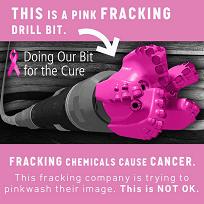Shale Gas Development and Infant Health
October 10, 2014Chemicals Used in Hydraulic Fracturing
October 13, 2014DCS is protesting the recent decision by Susan G. Komen to partner with fracker Baker Hughes (see our letter below). Please join in this protest by writing a letter, for the greatest impact, or sending an email. Feel free to borrow language from our letter, if you like.
Download our letter as a Word document, for use in writing your own letter.
Dr. Judith A. Salerno, CEO
5005 LBJ Freeway Suite 250
Dallas, TX 75244
Dear Dr. Salerno,
We are appalled to learn that you have joined with a major drilling company, Baker Hughes, to “end breast cancer forever.” While this goal is laudable, the means you have chosen to pursue it, and the cover it gives to the fracking industry, will actually increase health risks for many people, including the risk of breast cancer, the very disease you are supposedly fighting.
According to Salon.com, you reached this partnering decision because you believe “the evidence to this point does not establish a connection between fracking and breast cancer.” Perhaps you are not aware of, or do not care about, all of the other health risks that have been linked to fracking.
Even if you only care about breast cancer, you should be aware that fracking has been linked to an increased risk for this disease. As reported in the Denton Record-Chronicle (Texas) “invasive breast cancer is on the rise in Denton County and five neighboring counties, even as the incidence rate for the disease is lower in the state and falling across the rest of the nation.” These are the counties that have the most intensive gas drilling development of the Barnett Shale. You should also be aware that “Breast Cancer Action opposes hydraulic fracturing because the practice exposes people to endocrine disruptors and carcinogenic chemicals that are linked to breast cancer.”
Here is a small sample of more of the reported risks of fracking:
- “University of Missouri researchers have found greater hormone-disrupting properties in water located near hydraulic fracturing drilling sites than in areas without drilling. Exposure to endocrine-disrupting chemicals, such as those studied in the MU research, has been linked by other research to cancer, birth defects and infertility.”
- Fracking has been linked to low birth weight and decreased term birth weight in infants.
- Workers at sites were fracking occurs are routinely exposed to high levels of benzene, a known carcinogen.
- Of the 750 compounds commonly used in fracking, more than 650 are known or possible human carcinogens, regulated under the Safe Drinking Water Act, or listed as hazardous air pollutants. Many are known endocrine disruptors.
- According to Concerned Health Professionals of NY, “the findings from the scientific, medical, and journalistic investigations indicate that fracking poses significant threats to air, water, health, public safety, and long-term economic vitality.”
- Fracking produces large volumes of technologically-enhance, naturally-occurring radioactive materials (TENORM) for which we have no viable method of decontamination and disposal. This makes “every existing shale well is a ticking time bomb waiting to unleash an irradiated deluge.”
It appears that Susan G. Komen is willing to look the other way and ignore the scientific evidence for a large enough donation. How much would it take for you to team up with a tobacco company in marketing Komen pink cigarettes?
We are sorry to say that we will no longer be able to support your organization and that we are urging all within earshot to also withdraw their support.
Sincerely,
Barbara Arrindell
Director
Damascus Citizens for Sustainability





